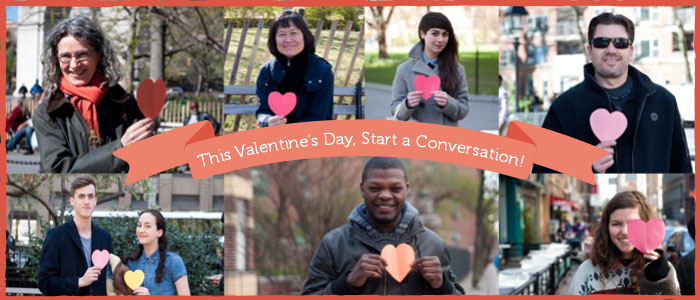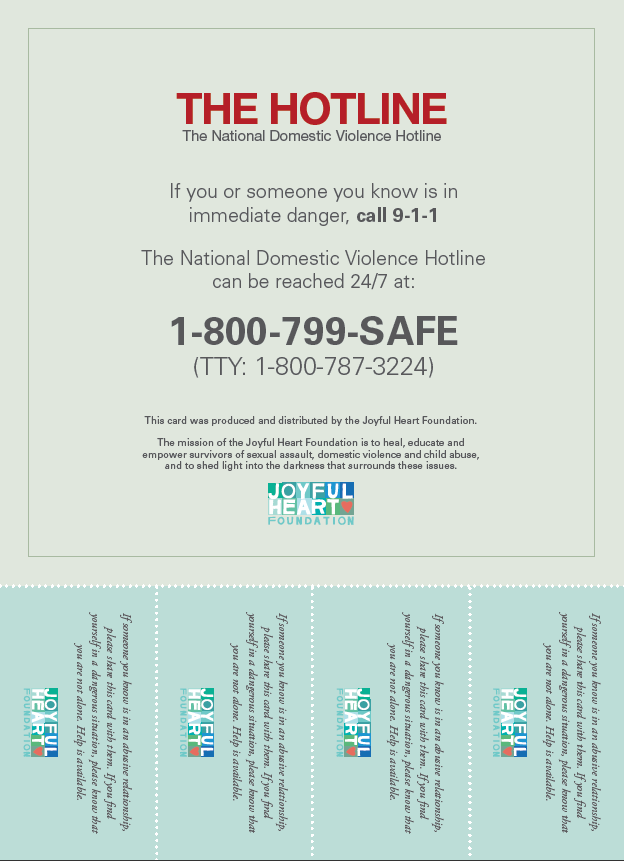You can leave this site quickly.
Learn more about Internet safety.
Breaking the Silence to Break the Cycle
Knowing and recognizing the signs of an abusive relationship can truly save a life—we’ve heard it time and time again from survivors, their loved ones and even from bystanders. When these signs are recognized and brought to light, a simple conversation can help interrupt isolation, create a support system and help a person experiencing abuse find pathways to safety, perhaps even helping them to begin their healing journey.
In order to recognize the signs of an unhealthy or abusive relationship, a vital part of this conversation is being able to identify factors that make up a healthy relationship. Understanding what a healthy relationship looks like can help us deepen and improve our own relationships, and can contextualize what it means to maintain mutually supportive and loving partnerships. In order to prevent unhealthy relationships—and in some cases, to prevent relationships with unhealthy traits from turning abusive—we must be clear on what constitutes a strong partnership. Mutual respect, open communication, ongoing consent and respect of boundaries are all important factors in maintaining a healthy relationship.
We also acknowledge that relationships are a work in progress. As people change and life shifts, relationships can slide along a spectrum—from great to so-so, healthy to unhealthy, or from unhealthy to abusive. Having a deep understanding of what a healthy relationship is can help open dialogues and ensure that our loved ones—children and teens included—know that abuse, power or control are never part of one.
It’s a startling statistic that 1 in 3 teenagers will experience dating violence before the age of 18. One in every 4 women experience severe physical violence by an intimate partner. Over 15 million children witness violence in their homes each year. Joyful Heart recently joined our partners, loveisrespect and Break the Cycle, to discuss this issue during the 8th annual NO MORE Silence: It’s Time to Talk Day.
Held in honor of Teen Dating Violence Awareness Month, the event consisted of an expert panel, including Olympic Gold Medalist Jordyn Wieber, her mother Rita Wieber, Morris Chestnut, Sharon Love of the One Love Foundation and more.
One of the many topics raised during the panel was how difficult, and potentially awkward, a conversation of this nature could be for parents, teens and bystanders alike. This is especially relevant to bystander intervention—someone who is not directly involved in the relationship. Many expressed concerns about saying the wrong thing, or worries about how to naturally begin the conversation. One tip to starting a conversation was to begin by asking someone, “What do you think a healthy relationship looks like?” or “who do you think has a healthy relationship?” For more tips on how to engage in a conversation about healthy relationships, especially as parents, please click here.
Joyful Heart offers many resources about who domestic violence can affect and how you can recognize the signs of an abusive relationship. We invite you to utilize them to help others learn about relationships and the way they can impact a person and those around them.
This Valentine’s Day, we ask you to start this conversation in whatever way you can.

With those you care about:
Parents and educators can visit Break the Cycle for more tools on how to start the conversation with your children and teens. Teens and youth can visit loveisrespect for resources designed specifically for them.
 In your community:
In your community:
To learn and share the signs, as well as resources, we welcome you to download our flier, created in partnership with the National Domestic Violence Hotline. Display it in your place of work, community center, salon, school or place of worship so your community can learn the signs of abusive relationships and connect to resources.
Online and through social media:
Lastly, we invite you to help us share this message and the resources available online. Click here to share this message over email with those you love. And help spread the message about what you think #loveis on Twitter. We’ll be sharing your posts and helping spread your messages all day.
I believe #loveis....MUTUAL RESPSECT.
I believe #loveis....HONESTY AND TRUST.
I believe #loveis...OPEN COMMUNICATION.
Tweet your own in just a click.
Lastly, we ask you to join us in talking about relationships—all types of relationships—with one another and open up a dialogue to destigmatize these issues and start the conversations around how to promote and sustain healthy relationships.




Your Voices